International Accounting: Carrefour & Disney Financial Analysis Report
VerifiedAdded on 2022/08/23
|9
|1610
|21
Report
AI Summary
This report analyzes international accounting principles, focusing on Carrefour and Disney's financial statements. It examines the basis of accounting used by Carrefour, calculates its current ratio, and explains harmonization and convergence of accounting standards. The report discusses arguments for and against the U.S. adopting convergence, and identifies the standard-setting bodies. It also explores issues related to the China Agritech fraud, the adoption status of IFRS in Azerbaijan and Laos, and calculates the Return on Investment (ROI) for Disney's segments. Furthermore, it addresses the differences between GAAP and IFRS, consolidation, and the Foreign Corrupt Practices Act (FCPA). The analysis incorporates references to relevant academic literature and financial statements to support the findings. The report also covers reportable segments as defined by IFRS 8.
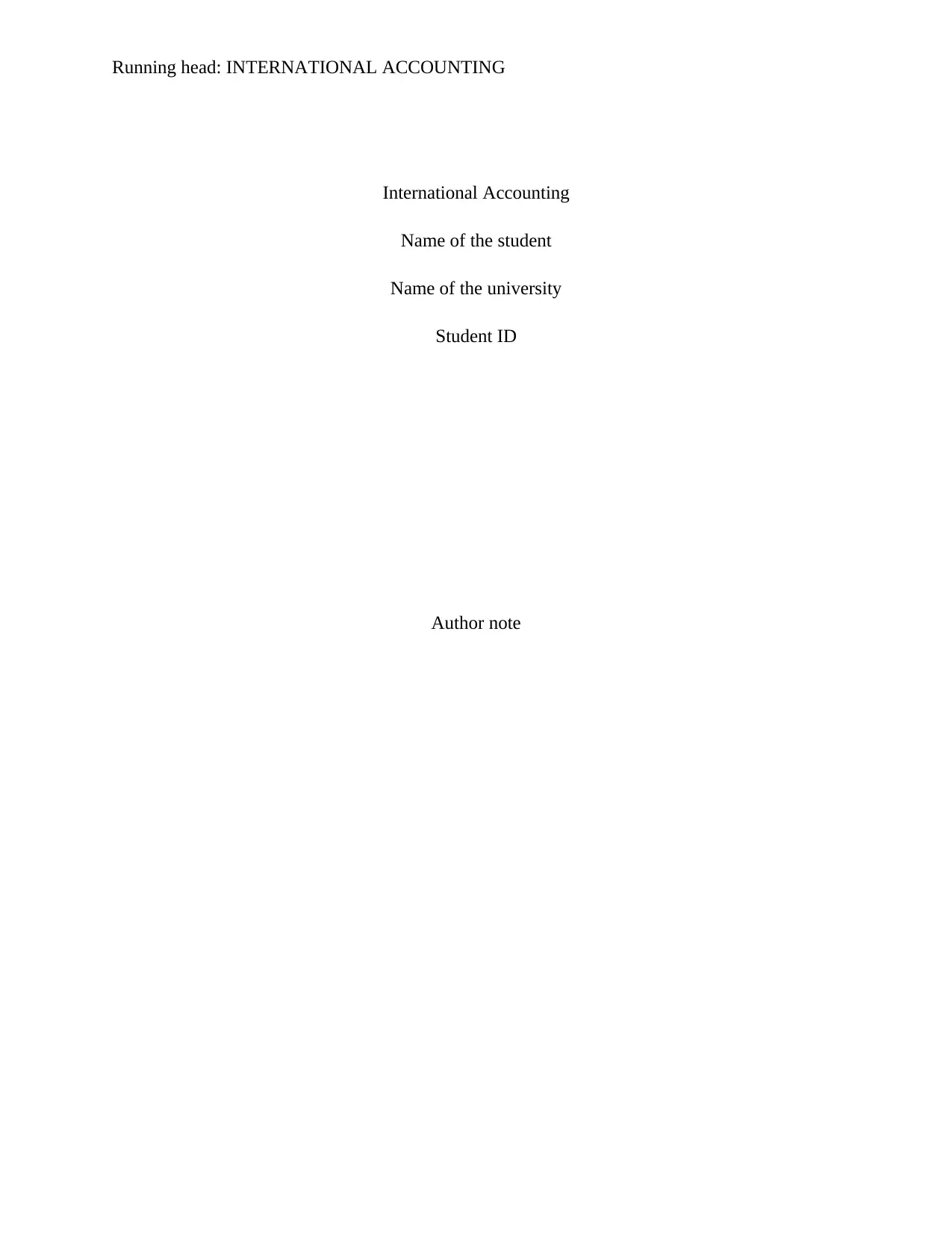
Running head: INTERNATIONAL ACCOUNTING
International Accounting
Name of the student
Name of the university
Student ID
Author note
International Accounting
Name of the student
Name of the university
Student ID
Author note
Paraphrase This Document
Need a fresh take? Get an instant paraphrase of this document with our AI Paraphraser
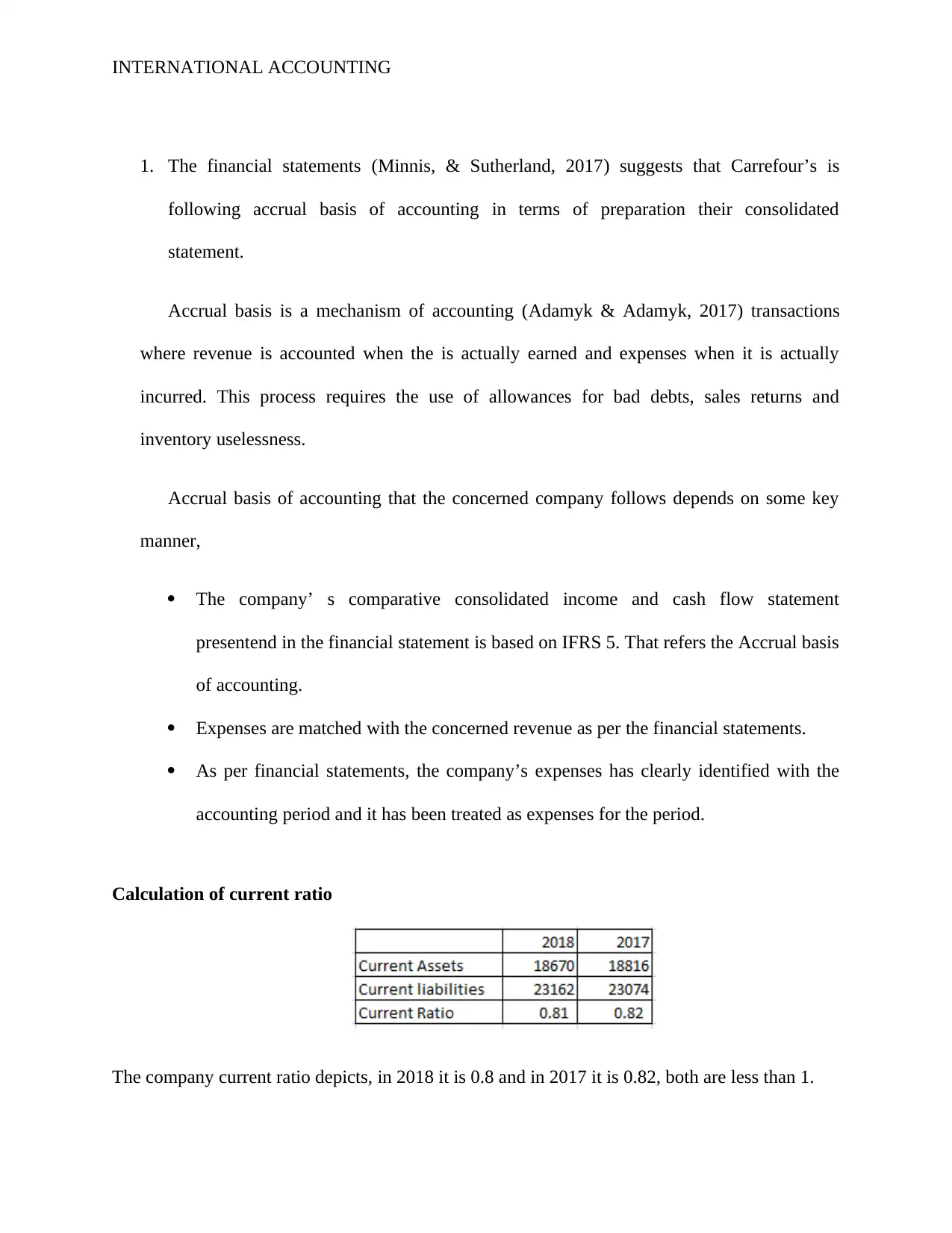
INTERNATIONAL ACCOUNTING
1. The financial statements (Minnis, & Sutherland, 2017) suggests that Carrefour’s is
following accrual basis of accounting in terms of preparation their consolidated
statement.
Accrual basis is a mechanism of accounting (Adamyk & Adamyk, 2017) transactions
where revenue is accounted when the is actually earned and expenses when it is actually
incurred. This process requires the use of allowances for bad debts, sales returns and
inventory uselessness.
Accrual basis of accounting that the concerned company follows depends on some key
manner,
The company’ s comparative consolidated income and cash flow statement
presentend in the financial statement is based on IFRS 5. That refers the Accrual basis
of accounting.
Expenses are matched with the concerned revenue as per the financial statements.
As per financial statements, the company’s expenses has clearly identified with the
accounting period and it has been treated as expenses for the period.
Calculation of current ratio
The company current ratio depicts, in 2018 it is 0.8 and in 2017 it is 0.82, both are less than 1.
1. The financial statements (Minnis, & Sutherland, 2017) suggests that Carrefour’s is
following accrual basis of accounting in terms of preparation their consolidated
statement.
Accrual basis is a mechanism of accounting (Adamyk & Adamyk, 2017) transactions
where revenue is accounted when the is actually earned and expenses when it is actually
incurred. This process requires the use of allowances for bad debts, sales returns and
inventory uselessness.
Accrual basis of accounting that the concerned company follows depends on some key
manner,
The company’ s comparative consolidated income and cash flow statement
presentend in the financial statement is based on IFRS 5. That refers the Accrual basis
of accounting.
Expenses are matched with the concerned revenue as per the financial statements.
As per financial statements, the company’s expenses has clearly identified with the
accounting period and it has been treated as expenses for the period.
Calculation of current ratio
The company current ratio depicts, in 2018 it is 0.8 and in 2017 it is 0.82, both are less than 1.
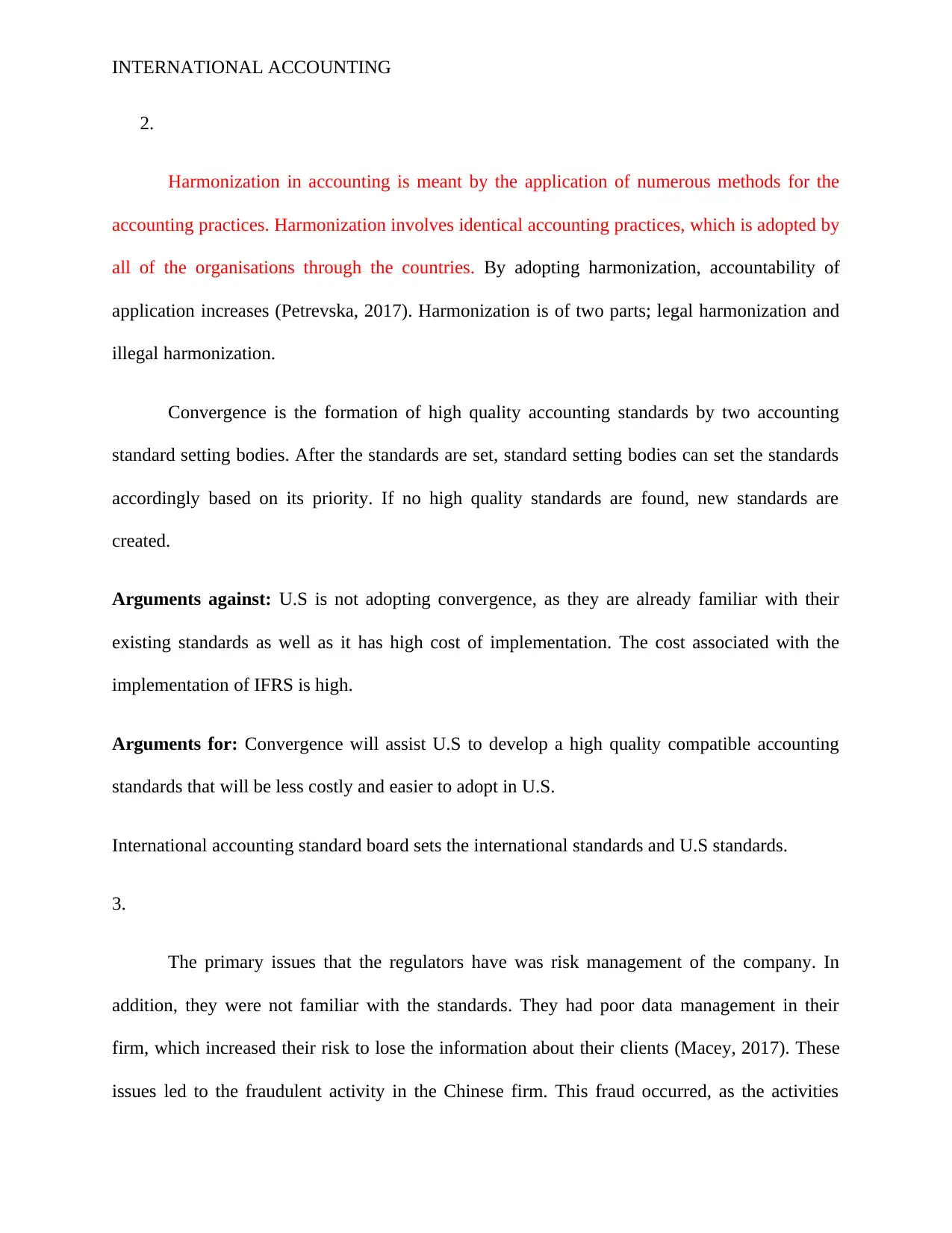
INTERNATIONAL ACCOUNTING
2.
Harmonization in accounting is meant by the application of numerous methods for the
accounting practices. Harmonization involves identical accounting practices, which is adopted by
all of the organisations through the countries. By adopting harmonization, accountability of
application increases (Petrevska, 2017). Harmonization is of two parts; legal harmonization and
illegal harmonization.
Convergence is the formation of high quality accounting standards by two accounting
standard setting bodies. After the standards are set, standard setting bodies can set the standards
accordingly based on its priority. If no high quality standards are found, new standards are
created.
Arguments against: U.S is not adopting convergence, as they are already familiar with their
existing standards as well as it has high cost of implementation. The cost associated with the
implementation of IFRS is high.
Arguments for: Convergence will assist U.S to develop a high quality compatible accounting
standards that will be less costly and easier to adopt in U.S.
International accounting standard board sets the international standards and U.S standards.
3.
The primary issues that the regulators have was risk management of the company. In
addition, they were not familiar with the standards. They had poor data management in their
firm, which increased their risk to lose the information about their clients (Macey, 2017). These
issues led to the fraudulent activity in the Chinese firm. This fraud occurred, as the activities
2.
Harmonization in accounting is meant by the application of numerous methods for the
accounting practices. Harmonization involves identical accounting practices, which is adopted by
all of the organisations through the countries. By adopting harmonization, accountability of
application increases (Petrevska, 2017). Harmonization is of two parts; legal harmonization and
illegal harmonization.
Convergence is the formation of high quality accounting standards by two accounting
standard setting bodies. After the standards are set, standard setting bodies can set the standards
accordingly based on its priority. If no high quality standards are found, new standards are
created.
Arguments against: U.S is not adopting convergence, as they are already familiar with their
existing standards as well as it has high cost of implementation. The cost associated with the
implementation of IFRS is high.
Arguments for: Convergence will assist U.S to develop a high quality compatible accounting
standards that will be less costly and easier to adopt in U.S.
International accounting standard board sets the international standards and U.S standards.
3.
The primary issues that the regulators have was risk management of the company. In
addition, they were not familiar with the standards. They had poor data management in their
firm, which increased their risk to lose the information about their clients (Macey, 2017). These
issues led to the fraudulent activity in the Chinese firm. This fraud occurred, as the activities
⊘ This is a preview!⊘
Do you want full access?
Subscribe today to unlock all pages.

Trusted by 1+ million students worldwide
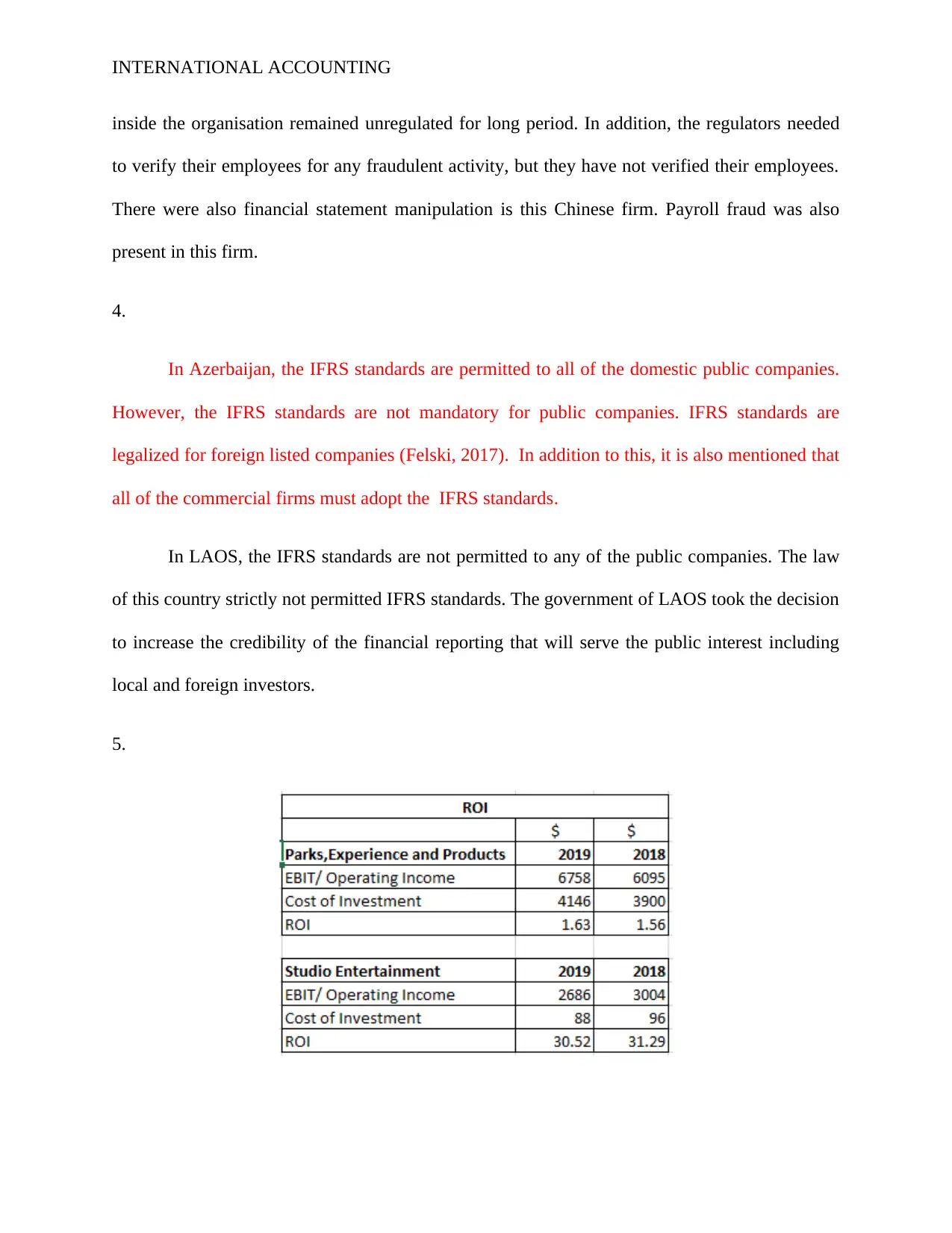
INTERNATIONAL ACCOUNTING
inside the organisation remained unregulated for long period. In addition, the regulators needed
to verify their employees for any fraudulent activity, but they have not verified their employees.
There were also financial statement manipulation is this Chinese firm. Payroll fraud was also
present in this firm.
4.
In Azerbaijan, the IFRS standards are permitted to all of the domestic public companies.
However, the IFRS standards are not mandatory for public companies. IFRS standards are
legalized for foreign listed companies (Felski, 2017). In addition to this, it is also mentioned that
all of the commercial firms must adopt the IFRS standards.
In LAOS, the IFRS standards are not permitted to any of the public companies. The law
of this country strictly not permitted IFRS standards. The government of LAOS took the decision
to increase the credibility of the financial reporting that will serve the public interest including
local and foreign investors.
5.
inside the organisation remained unregulated for long period. In addition, the regulators needed
to verify their employees for any fraudulent activity, but they have not verified their employees.
There were also financial statement manipulation is this Chinese firm. Payroll fraud was also
present in this firm.
4.
In Azerbaijan, the IFRS standards are permitted to all of the domestic public companies.
However, the IFRS standards are not mandatory for public companies. IFRS standards are
legalized for foreign listed companies (Felski, 2017). In addition to this, it is also mentioned that
all of the commercial firms must adopt the IFRS standards.
In LAOS, the IFRS standards are not permitted to any of the public companies. The law
of this country strictly not permitted IFRS standards. The government of LAOS took the decision
to increase the credibility of the financial reporting that will serve the public interest including
local and foreign investors.
5.
Paraphrase This Document
Need a fresh take? Get an instant paraphrase of this document with our AI Paraphraser
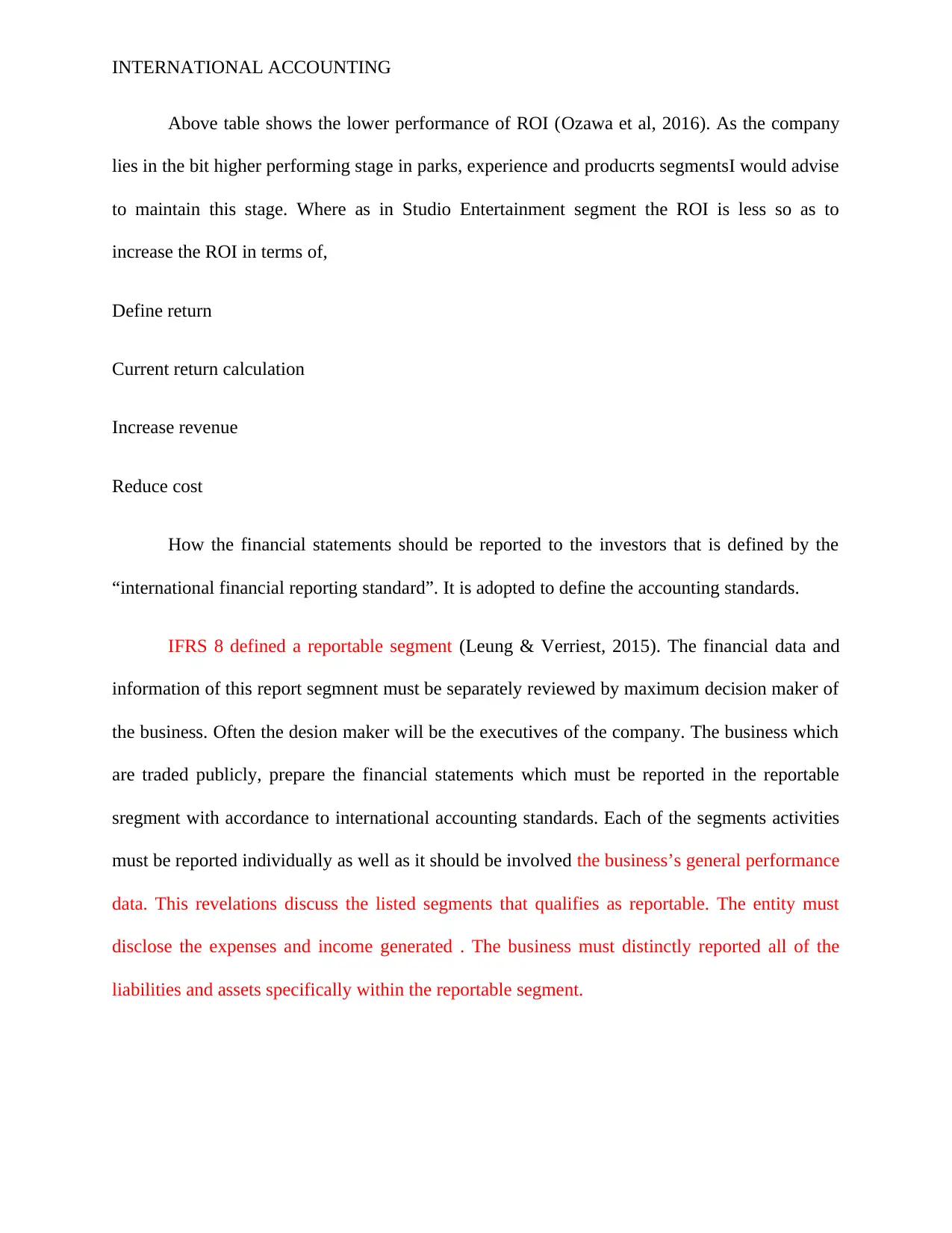
INTERNATIONAL ACCOUNTING
Above table shows the lower performance of ROI (Ozawa et al, 2016). As the company
lies in the bit higher performing stage in parks, experience and producrts segmentsI would advise
to maintain this stage. Where as in Studio Entertainment segment the ROI is less so as to
increase the ROI in terms of,
Define return
Current return calculation
Increase revenue
Reduce cost
How the financial statements should be reported to the investors that is defined by the
“international financial reporting standard”. It is adopted to define the accounting standards.
IFRS 8 defined a reportable segment (Leung & Verriest, 2015). The financial data and
information of this report segmnent must be separately reviewed by maximum decision maker of
the business. Often the desion maker will be the executives of the company. The business which
are traded publicly, prepare the financial statements which must be reported in the reportable
sregment with accordance to international accounting standards. Each of the segments activities
must be reported individually as well as it should be involved the business’s general performance
data. This revelations discuss the listed segments that qualifies as reportable. The entity must
disclose the expenses and income generated . The business must distinctly reported all of the
liabilities and assets specifically within the reportable segment.
Above table shows the lower performance of ROI (Ozawa et al, 2016). As the company
lies in the bit higher performing stage in parks, experience and producrts segmentsI would advise
to maintain this stage. Where as in Studio Entertainment segment the ROI is less so as to
increase the ROI in terms of,
Define return
Current return calculation
Increase revenue
Reduce cost
How the financial statements should be reported to the investors that is defined by the
“international financial reporting standard”. It is adopted to define the accounting standards.
IFRS 8 defined a reportable segment (Leung & Verriest, 2015). The financial data and
information of this report segmnent must be separately reviewed by maximum decision maker of
the business. Often the desion maker will be the executives of the company. The business which
are traded publicly, prepare the financial statements which must be reported in the reportable
sregment with accordance to international accounting standards. Each of the segments activities
must be reported individually as well as it should be involved the business’s general performance
data. This revelations discuss the listed segments that qualifies as reportable. The entity must
disclose the expenses and income generated . The business must distinctly reported all of the
liabilities and assets specifically within the reportable segment.
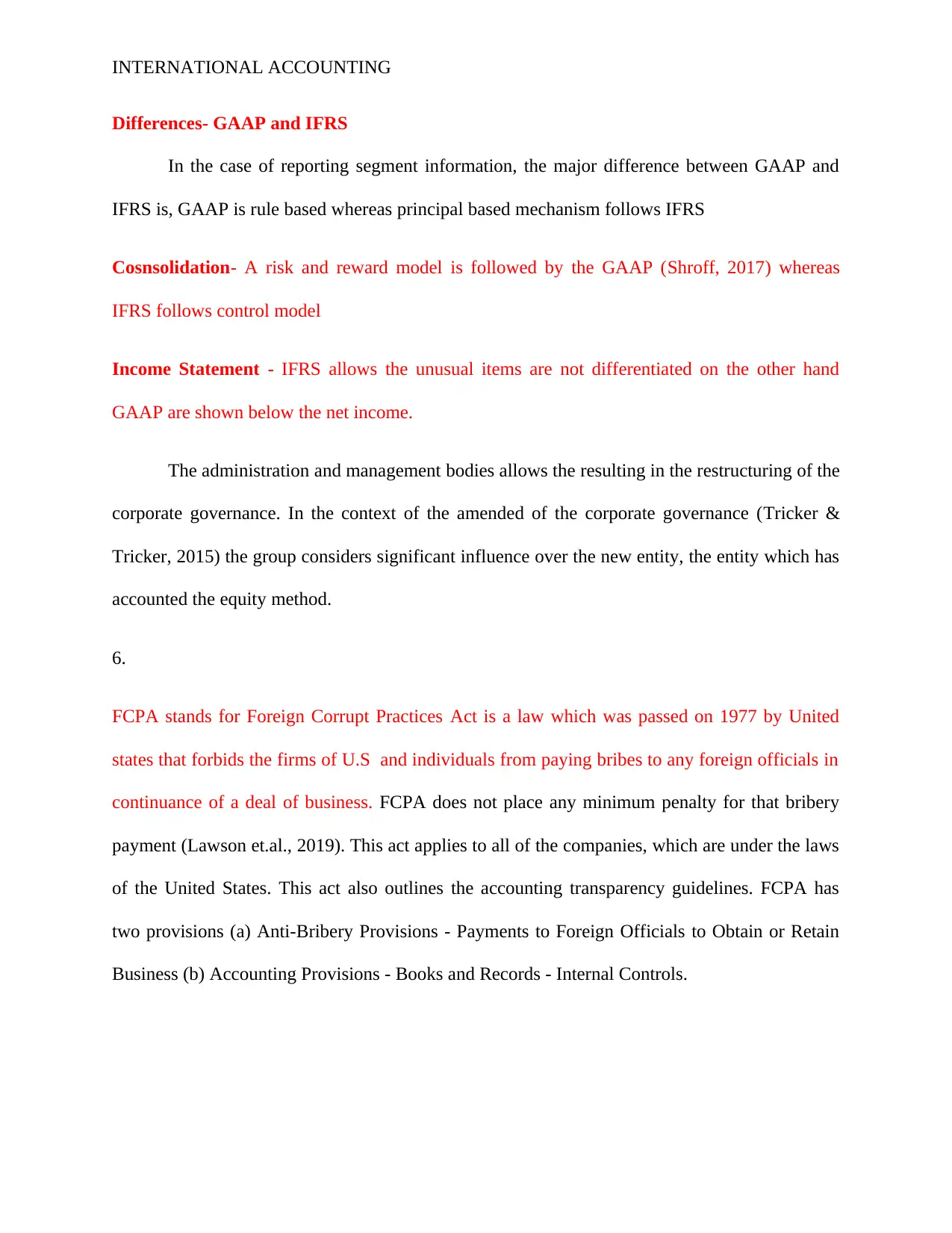
INTERNATIONAL ACCOUNTING
Differences- GAAP and IFRS
In the case of reporting segment information, the major difference between GAAP and
IFRS is, GAAP is rule based whereas principal based mechanism follows IFRS
Cosnsolidation- A risk and reward model is followed by the GAAP (Shroff, 2017) whereas
IFRS follows control model
Income Statement - IFRS allows the unusual items are not differentiated on the other hand
GAAP are shown below the net income.
The administration and management bodies allows the resulting in the restructuring of the
corporate governance. In the context of the amended of the corporate governance (Tricker &
Tricker, 2015) the group considers significant influence over the new entity, the entity which has
accounted the equity method.
6.
FCPA stands for Foreign Corrupt Practices Act is a law which was passed on 1977 by United
states that forbids the firms of U.S and individuals from paying bribes to any foreign officials in
continuance of a deal of business. FCPA does not place any minimum penalty for that bribery
payment (Lawson et.al., 2019). This act applies to all of the companies, which are under the laws
of the United States. This act also outlines the accounting transparency guidelines. FCPA has
two provisions (a) Anti-Bribery Provisions - Payments to Foreign Officials to Obtain or Retain
Business (b) Accounting Provisions - Books and Records - Internal Controls.
Differences- GAAP and IFRS
In the case of reporting segment information, the major difference between GAAP and
IFRS is, GAAP is rule based whereas principal based mechanism follows IFRS
Cosnsolidation- A risk and reward model is followed by the GAAP (Shroff, 2017) whereas
IFRS follows control model
Income Statement - IFRS allows the unusual items are not differentiated on the other hand
GAAP are shown below the net income.
The administration and management bodies allows the resulting in the restructuring of the
corporate governance. In the context of the amended of the corporate governance (Tricker &
Tricker, 2015) the group considers significant influence over the new entity, the entity which has
accounted the equity method.
6.
FCPA stands for Foreign Corrupt Practices Act is a law which was passed on 1977 by United
states that forbids the firms of U.S and individuals from paying bribes to any foreign officials in
continuance of a deal of business. FCPA does not place any minimum penalty for that bribery
payment (Lawson et.al., 2019). This act applies to all of the companies, which are under the laws
of the United States. This act also outlines the accounting transparency guidelines. FCPA has
two provisions (a) Anti-Bribery Provisions - Payments to Foreign Officials to Obtain or Retain
Business (b) Accounting Provisions - Books and Records - Internal Controls.
⊘ This is a preview!⊘
Do you want full access?
Subscribe today to unlock all pages.

Trusted by 1+ million students worldwide
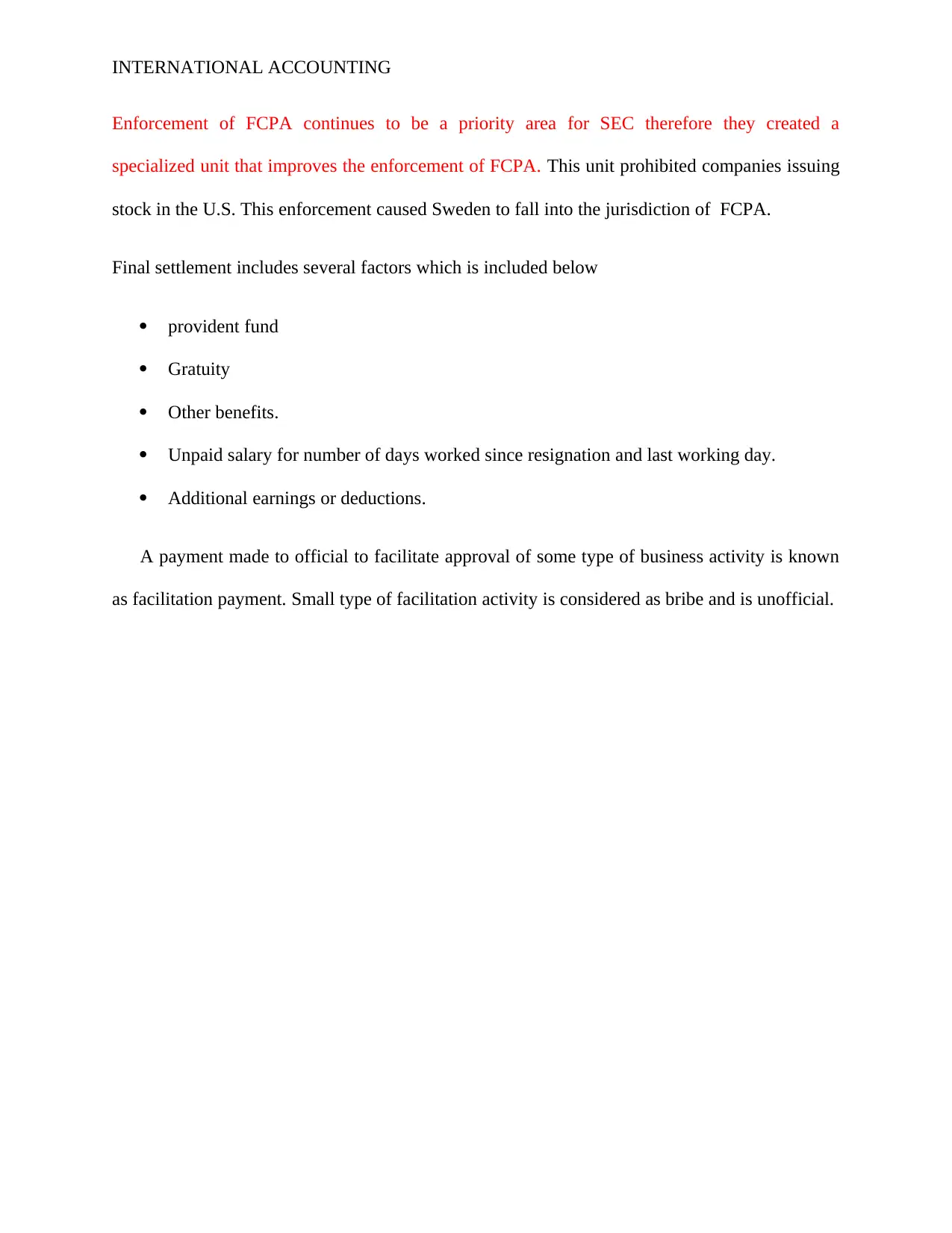
INTERNATIONAL ACCOUNTING
Enforcement of FCPA continues to be a priority area for SEC therefore they created a
specialized unit that improves the enforcement of FCPA. This unit prohibited companies issuing
stock in the U.S. This enforcement caused Sweden to fall into the jurisdiction of FCPA.
Final settlement includes several factors which is included below
provident fund
Gratuity
Other benefits.
Unpaid salary for number of days worked since resignation and last working day.
Additional earnings or deductions.
A payment made to official to facilitate approval of some type of business activity is known
as facilitation payment. Small type of facilitation activity is considered as bribe and is unofficial.
Enforcement of FCPA continues to be a priority area for SEC therefore they created a
specialized unit that improves the enforcement of FCPA. This unit prohibited companies issuing
stock in the U.S. This enforcement caused Sweden to fall into the jurisdiction of FCPA.
Final settlement includes several factors which is included below
provident fund
Gratuity
Other benefits.
Unpaid salary for number of days worked since resignation and last working day.
Additional earnings or deductions.
A payment made to official to facilitate approval of some type of business activity is known
as facilitation payment. Small type of facilitation activity is considered as bribe and is unofficial.
Paraphrase This Document
Need a fresh take? Get an instant paraphrase of this document with our AI Paraphraser
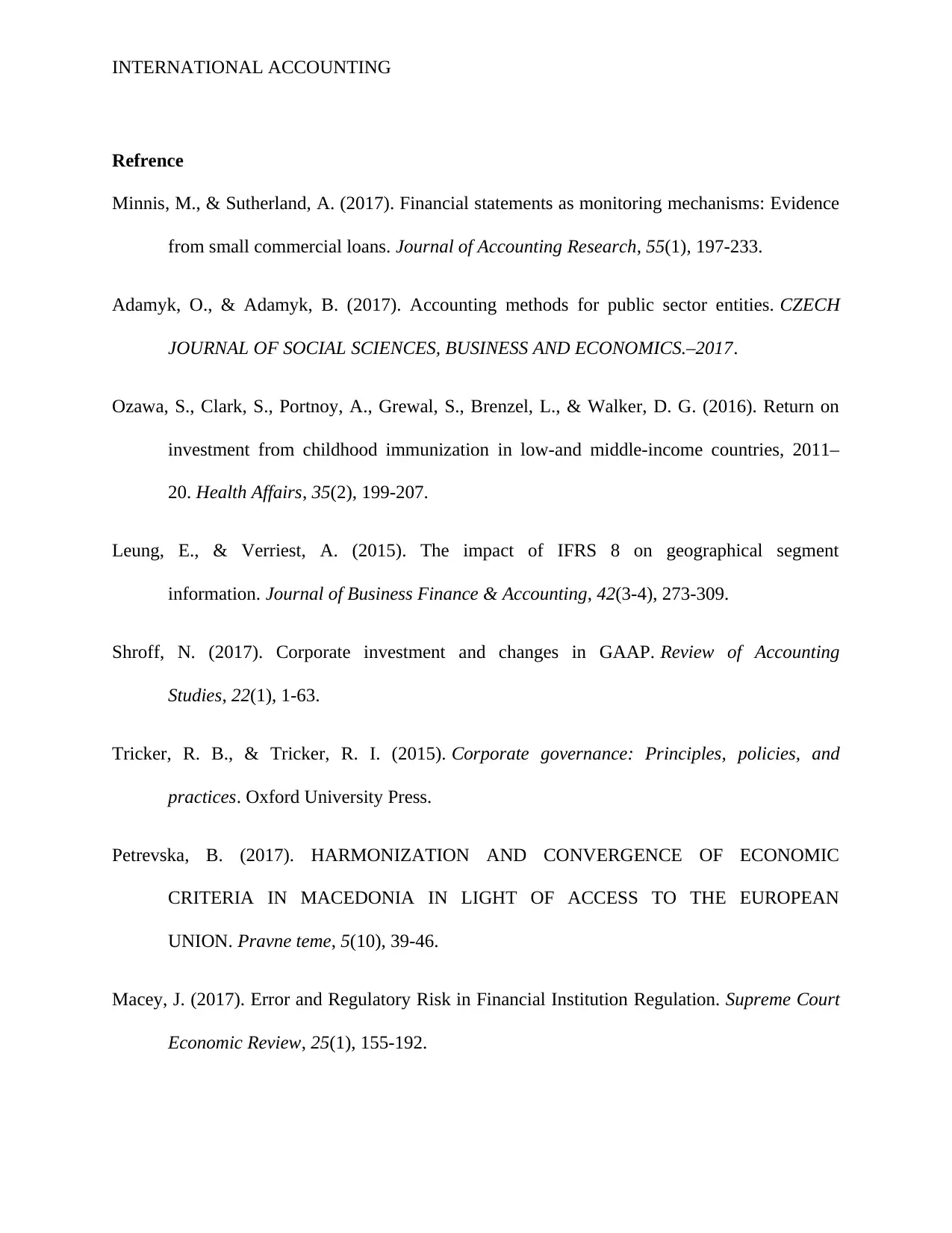
INTERNATIONAL ACCOUNTING
Refrence
Minnis, M., & Sutherland, A. (2017). Financial statements as monitoring mechanisms: Evidence
from small commercial loans. Journal of Accounting Research, 55(1), 197-233.
Adamyk, O., & Adamyk, B. (2017). Accounting methods for public sector entities. CZECH
JOURNAL OF SOCIAL SCIENCES, BUSINESS AND ECONOMICS.–2017.
Ozawa, S., Clark, S., Portnoy, A., Grewal, S., Brenzel, L., & Walker, D. G. (2016). Return on
investment from childhood immunization in low-and middle-income countries, 2011–
20. Health Affairs, 35(2), 199-207.
Leung, E., & Verriest, A. (2015). The impact of IFRS 8 on geographical segment
information. Journal of Business Finance & Accounting, 42(3-4), 273-309.
Shroff, N. (2017). Corporate investment and changes in GAAP. Review of Accounting
Studies, 22(1), 1-63.
Tricker, R. B., & Tricker, R. I. (2015). Corporate governance: Principles, policies, and
practices. Oxford University Press.
Petrevska, B. (2017). HARMONIZATION AND CONVERGENCE OF ECONOMIC
CRITERIA IN MACEDONIA IN LIGHT OF ACCESS TO THE EUROPEAN
UNION. Pravne teme, 5(10), 39-46.
Macey, J. (2017). Error and Regulatory Risk in Financial Institution Regulation. Supreme Court
Economic Review, 25(1), 155-192.
Refrence
Minnis, M., & Sutherland, A. (2017). Financial statements as monitoring mechanisms: Evidence
from small commercial loans. Journal of Accounting Research, 55(1), 197-233.
Adamyk, O., & Adamyk, B. (2017). Accounting methods for public sector entities. CZECH
JOURNAL OF SOCIAL SCIENCES, BUSINESS AND ECONOMICS.–2017.
Ozawa, S., Clark, S., Portnoy, A., Grewal, S., Brenzel, L., & Walker, D. G. (2016). Return on
investment from childhood immunization in low-and middle-income countries, 2011–
20. Health Affairs, 35(2), 199-207.
Leung, E., & Verriest, A. (2015). The impact of IFRS 8 on geographical segment
information. Journal of Business Finance & Accounting, 42(3-4), 273-309.
Shroff, N. (2017). Corporate investment and changes in GAAP. Review of Accounting
Studies, 22(1), 1-63.
Tricker, R. B., & Tricker, R. I. (2015). Corporate governance: Principles, policies, and
practices. Oxford University Press.
Petrevska, B. (2017). HARMONIZATION AND CONVERGENCE OF ECONOMIC
CRITERIA IN MACEDONIA IN LIGHT OF ACCESS TO THE EUROPEAN
UNION. Pravne teme, 5(10), 39-46.
Macey, J. (2017). Error and Regulatory Risk in Financial Institution Regulation. Supreme Court
Economic Review, 25(1), 155-192.
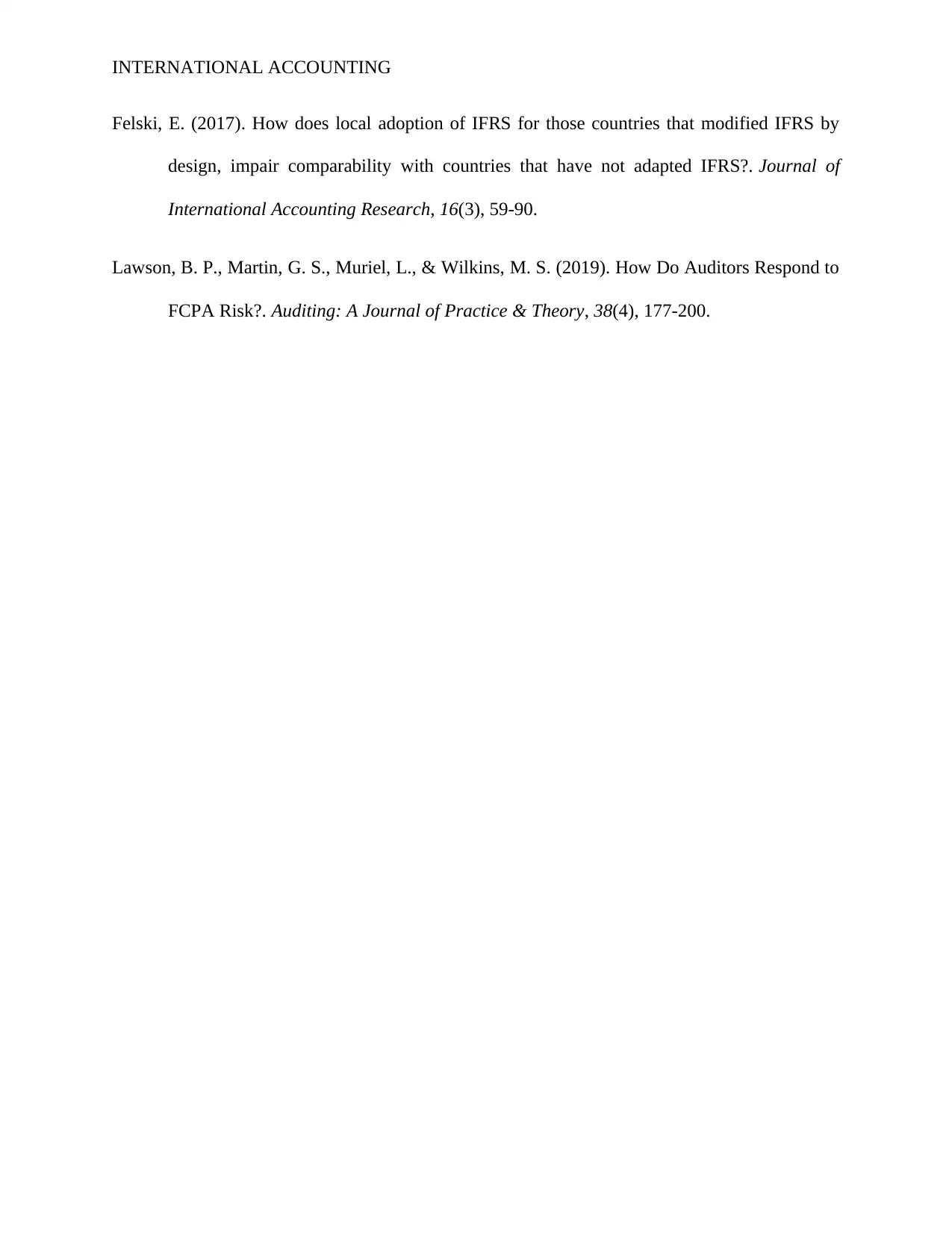
INTERNATIONAL ACCOUNTING
Felski, E. (2017). How does local adoption of IFRS for those countries that modified IFRS by
design, impair comparability with countries that have not adapted IFRS?. Journal of
International Accounting Research, 16(3), 59-90.
Lawson, B. P., Martin, G. S., Muriel, L., & Wilkins, M. S. (2019). How Do Auditors Respond to
FCPA Risk?. Auditing: A Journal of Practice & Theory, 38(4), 177-200.
Felski, E. (2017). How does local adoption of IFRS for those countries that modified IFRS by
design, impair comparability with countries that have not adapted IFRS?. Journal of
International Accounting Research, 16(3), 59-90.
Lawson, B. P., Martin, G. S., Muriel, L., & Wilkins, M. S. (2019). How Do Auditors Respond to
FCPA Risk?. Auditing: A Journal of Practice & Theory, 38(4), 177-200.
⊘ This is a preview!⊘
Do you want full access?
Subscribe today to unlock all pages.

Trusted by 1+ million students worldwide
1 out of 9
Related Documents
Your All-in-One AI-Powered Toolkit for Academic Success.
+13062052269
info@desklib.com
Available 24*7 on WhatsApp / Email
![[object Object]](/_next/static/media/star-bottom.7253800d.svg)
Unlock your academic potential
Copyright © 2020–2026 A2Z Services. All Rights Reserved. Developed and managed by ZUCOL.





